Patrick Henry
Patrick Henry (29 May 1736 – 6 June 1799) was an American attorney, planter and politician who became known as an orator during the movement for independence in Virginia in the 1770s. A U.S. Founding Father, he served as the first and sixth post-colonial Governor of Virginia, from 1776 to 1779 and from 1784 to 1786. Henry led the opposition to the Stamp Act 1765 and is remembered for the "Give me liberty, or give me death!" speech attributed to him. Along with Samuel Adams and Thomas Paine, he is regarded as one of the most influential champions of Republicanism and an invested promoter of the American Revolution and its fight for independence.
After the Revolution, Henry was a leader of the anti-federalists in Virginia. He opposed the United States Constitution, fearing that it endangered the rights of the States as well as the freedoms of individuals; he helped gain adoption of the Bill of Rights.
Quotes[edit]
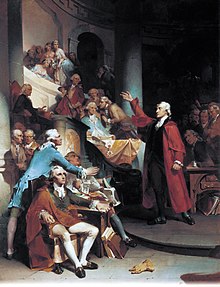


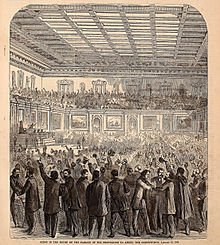
1760s[edit]
Speech on the Parson's Cause (1763)[edit]
- A King, by disallowing Acts of this salutary nature, from being the father of his people, degenerated into a Tyrant and forfeits all rights to his subjects' obedience.
- Speech on the Parson's Cause, in the Hanover County Courthouse (1763)
Speech on the Stamp Act (1765)[edit]
- Caesar had his Brutus, Charles the First his Cromwell; and George the Third — ["Treason!" cried the Speaker] — may profit by their example. If this be treason, make the most of it.
- Speech on the Stamp Act, Virginia House of Burgesses (29 May 1765), according to John Burk in The History of Virginia: From Its First Settlement to the Present Day (Dickson & Pescud, 1805), Volume 3, p. 309. The only contemporary account, written by an unknown French traveler, tells it differently:
- Shortly after I Came in one of the members stood up and said he had read that in former times tarquin and Julus had their Brutus, Charles had his Cromwell, and he Did not Doubt but some good american would stand up, in favour of his Country, but (says he) in a more moderate manner, and was going to Continue, when the speaker of the house rose and Said, he, the last that stood up had spoke traison, and was sorey to see that not one of the members of the house was loyal Enough to stop him, before he had gone so far. upon which the Same member stood up again (his name is henery) and said that if he had afronted the speaker, or the house, he was ready to ask pardon, and he would shew his loyalty to his majesty King G. the third, at the Expence of the last Drop of his blood, but what he had said must be atributed to the Interest of his Countrys Dying liberty which he had at heart, and the heat of passion might have lead him to have said something more than he intended, but, again, if he said any thing wrong, he beged the speaker and the houses pardon. some other Members stood up and backed him, on which that afaire was droped.
- Edmond Randolph gave a different alternate in his manuscript history of Virginia:
- In his harangue, he [Henry] certainly indulged a strain never before heard in the royal Capitol. This circumstance passed while he was speaking: “Caesar,” cried he, “had his Brutus; Charles the first his Cromwell; and George the third—” “Treason, sir,” exclaimed the Speaker, to which Henry instantly replied, “and George the third, may he never have either.”
- Speech on the Stamp Act, Virginia House of Burgesses (29 May 1765), according to John Burk in The History of Virginia: From Its First Settlement to the Present Day (Dickson & Pescud, 1805), Volume 3, p. 309. The only contemporary account, written by an unknown French traveler, tells it differently:
1770s[edit]
Speech in the First Continental Congress (1774)[edit]
- The distinctions between Virginians, Pennsylvanians, New Yorkers and New Englanders are no more. I am not a Virginian, but an American.
- Speech in the First Continental Congress, Philadelphia (14 October 1774). Compare: "I was born an American; I will live an American; I shall die an American!", Daniel Webster, Speech, July 17, 1850.
Letter to Robert Pleasants (1773)[edit]
- Full text of letter to Robert Pleasants (18 January 1773)
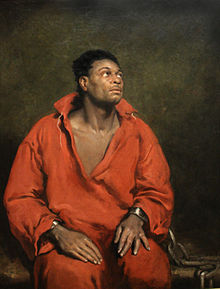
- It is not a little Surprising that Christianity, whose chief excellence consists of softening the human heart, in cherishing and improving its finer Feelings, should encourage a Practice so totally repugnant to the first Impression of Right and Wrong. What adds to the wonder is that this Abominable Practice has been introduced in the most enlightened Ages.
- As quoted in We Hold These Truths, by Randall Norman Desoto, pp. 72–73
- I shall honour the Quakers for their noble Effort to abolish Slavery. It is equally calculated to promote moral & political Good.
- I will not, I cannot justify it.
- I believe a time will come when an opportunity will be offered to abolish this lamentable evil. Everything we do is to improve it, if it happens in our day; if not, let us transmit to our descendants, together with our slaves, a pity for their unhappy lot and an abhorrence of slavery.
- As quoted in We Hold These Truths, by Randall Norman Desoto, p. 73
Speech in the Second Virginia Convention (1775)[edit]
- Give me liberty, or give me death!
- The speech was not published until The Port Folio printed a version of it in 1816. The version of the speech that is known today first appeared in print in Sketches of the Life and Character of Patrick Henry, a biography of Henry by William Wirt in 1817. Eyewitness accounts of John Roane, St. George Tucker, and John Tyler Sr. confirm the authenticity of these words as being spoken by Henry. See David McCants, "The Authenticity of William Wirt's Version of Patrick Henry's 'Liberty or Death' Speech," Virginia Magazine of History and Biography 87 (1979), pp. 387-402.
1780s[edit]
- Suspicion is a virtue as long as its object is the public good, and as long as it stays within proper bounds. … Guard with jealous attention the public liberty. Suspect every one who approaches that jewel.
- Speech on the Federal Constitution, Virginia Ratifying Convention (5 June 1788)
- This has sometimes been paraphrased as "Suspicion is a virtue if it is in the interests of the good of the people".
- Show me that age and country where the rights and liberties of the people were placed on the sole chance of their rulers being good men, without a consequent loss of liberty?
- Speech on the Federal Constitution, Virginia Ratifying Convention (5 June 1788).
- Let Mr. Madison tell me when did liberty ever exist when the sword and the purse were given up from the people? Unless a miracle shall interpose, no nation ever did, nor ever can retain its liberty after the loss of the sword and the purse.
- As quoted in The Debates in the Several States Conventions on the Adoption of the Federal Constitution also known as Elliot's Debates, Jonathan Elliot, edit. (1941) J. B. Lippincott Co., pp. 168-169, originally published in 1836
- When the American spirit was in its youth, the language of America was different: Liberty, Sir, was then the primary object.
- Speech on the Federal Constitution, Virginia Ratifying Convention (Thursday, 5 June 1788), as contained in The Debates in the Several State Conventions on the Adoption of the Federal Constitution: Volume 3, ed. Jonathan Elliot, published by the editor (1836), p. 65
- Are we at last brought to such an humiliating and debasing degradation, that we cannot be trusted with arms for our defense? Where is the difference between having our arms in possession and under our direction, and having them under the management of Congress? If our defense be the real object of having those arms, in whose hands can they be trusted with more propriety or equal safety to us, as in our own hands?
- Speech on the Federal Constitution, Virginia Ratifying Convention (Monday, 9 June 1788), as contained in The Debates in the Several State Conventions on the Adoption of the Federal Constitution: Volume 3, ed. Jonathan Elliot, published by the editor (1836), pp. 168-169
- The liberties of a people never were, nor ever will be, secure, when the transactions of their rulers may be concealed from them.
- Speech on the Federal Constitution, Virginia Ratifying Convention (Monday, 9 June 1788), as contained in The Debates in the Several State Conventions on the Adoption of the Federal Constitution: Volume 3, ed. Jonathan Elliot, published by the editor (1836), p. 170
- The great object is that every man be armed… Everyone who is able may have a gun.
- Virginia Convention on the ratification of the Constitution(14 June 1788). Debates and other Proceedings of the Convention of Virginia, taken in shorthand by David Robertson of Petersburg, at 271, 275 2d ed. Richmond (1805)
Speech at the Virginia Convention (1788)[edit]
- With respect to that part of the proposal which says that every power not granted remains with the people, it must be previous to adoption, or it will involve this country in inevitable destruction. To talk of it as a thing subsequent, not as one of your unalienable rights, is leaving it to the casual opinion of the Congress who shall take up the consideration of that matter. They will not reason with you about the effect of this Constitution. They will not take the opinion of this committee concerning its operation. They will construe it as they please. If you place it subsequently, let me ask the consequences. Among ten thousand implied powers which they may assume, they may, if we be engaged in war, liberate every one of your slaves if they please. And this must and will be done by men, a majority of whom have not a common interest with you. They will, therefore, have no feeling of your interests. It has been repeatedly said here, that the great object of a national government was national defence. That power which is said to be intended for security and safety may be rendered detestable and oppressive. If they give power to the general government to provide for the general defence, the means must be commensurate to the end. All the means in the possession of the people must be given to the government which is intrusted with the public defence. In this state there are two hundred and thirty-six thousand blacks, and there are many in several other states. But there are few or none in the Northern States; and yet, if the Northern States shall be of opinion that our slaves are numberless, they may call forth every national resource. May Congress not say, that every black man must fight? Did we not see a little of this last war? We were not so hard pushed as to make emancipation general; but acts of Assembly passed that every slave who would go to the army should be free. Another thing will contribute to bring this event about. Slavery is detested. We feel its fatal effects—we deplore it with all the pity of humanity. Let all these considerations, at some future period, press with full force on the minds of Congress. Let that urbanity, which I trust will distinguish America, and the necessity of national defence,—let all these things operate on their minds; they will search that paper, and see if they have power of manumission. And have they not, sir? Have they not power to provide for the general defence and welfare? May they not think that these call for the abolition of slavery? May they not pronounce all slaves free, and will they not be warranted by that power? This is no ambiguous implication or logical deduction. The paper speaks to the point: they have the power in clear, unequivocal terms, and will clearly and certainly exercise it. As much as I deplore slavery, I see that prudence forbids its abolition. I deny that the general government ought to set them free, because a decided majority of the states have not the ties of sympathy and fellow-feeling for those whose interest would be affected by their emancipation. The majority of Congress is to the north, and the slaves are to the south.
- In this situation, I see a great deal of the property of the people of Virginia in jeopardy, and their peace and tranquillity gone. I repeat it again, that it would rejoice my very soul that every one of my fellow-beings was emancipated. As we ought with gratitude to admire that decree of Heaven which has numbered us among the free, we ought to lament and deplore the necessity of holding our fellowmen in bondage. But is it practicable, by any human means, to liberate them without producing the most dreadful and ruinous consequences? We ought to possess them in the manner we inherited them from our ancestors, as their manumission is incompatible with the felicity of our country. But we ought to soften, as much as possible, the rigor of their unhappy fate. I know that, in a variety of particular instances, the legislature, listening to complaints, have admitted their emancipation. Let me not dwell on this subject. I will only add that this, as well as every other property of the people of Virginia, is in jeopardy, and put in the hands of those who have no similarity of situation with us. This is a local matter, and I can see no propriety in subjecting it to Congress.
- With respect to subsequent amendments, proposed by the worthy member, I am distressed when I hear the expression. It is a new one altogether, and such a one as stands against every idea of fortitude and manliness in the states, or any one else. Evils admitted in order to be removed subsequently, and tyranny submitted to in order to be excluded by a subsequent alteration, are things totally new to me. . . . I ask, does experience warrant such a thing from the beginning of the world to this day? Do you enter into a compact first, and afterwards settle the terms of the government?
1790s[edit]
Last Will and Testament (1798)[edit]
- If she chuses to set free one or two of my slaves she is to have full power to do so.
- This is all the inheritance I can give to my dear family. The religion of Christ can give them one which will make them rich indeed.
- Last Will and Testament (20 November 1798), as quoted in Patrick Henry : Life, Correspondences and Speeches (1891) by William Wirt Henry, Vol. H, p. 631.
- This also often appears (incorrectly) as "I have now disposed of all my property to my family; there is one thing more I wish I could give them, and that is the Christian Religion. If they had that, and I had not given them one shilling, they would be rich; and if they had not that, and I had given them all the world, they would be poor." This version goes back at least to 1823, when it appeared in the 29 November 1823 issue of The Manchester Iris, a Weekly Literary and Scientific Miscellany, vol. II, p. 387. A complete transcription of the will may be found at the Red Hill Patrick Henry National Memorial website.
- Last Will and Testament (20 November 1798), as quoted in Patrick Henry : Life, Correspondences and Speeches (1891) by William Wirt Henry, Vol. H, p. 631.
Speech (1799)[edit]
- Let us trust God and our better judgment to set us right hereafter. United we stand, divided we fall. Let us not split into factions which must destroy that union upon which our existence hangs. Let us preserve our strength for the French, the English, the Germans, or whoever else shall dare invade our territory, and not exhaust it in civil commotions and intestine wars.
- Last public speech before his death (4 March 1799); as quoted in Patrick Henry: Life, Correspondences and Speeches (1891) by William Wirt Henry, Vol. 2,p. 609-610
Disputed[edit]
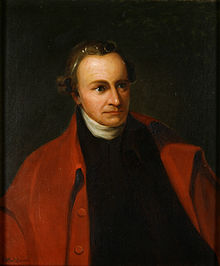
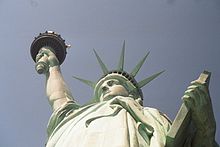

- The question before the House is one of awful moment to this country. For my own part, I consider it as nothing less than a question of freedom or slavery; and in proportion to the magnitude of the subject ought to be the freedom of the debate. It is only in this way that we can hope to arrive at truth, and fulfill the great responsibility which we hold to God and our country. Should I keep back my opinions at such a time, through fear of giving offense, I should consider myself as guilty of treason towards my country, and of an act of disloyalty toward the Majesty of Heaven, which I revere above all earthly kings.
- It is natural for man to indulge in the illusions of hope and pride. We are apt to shut our eyes against a painful truth, and listen to the song of that siren till she transforms us into beasts. Is this the part of wise men, engaged in a great and arduous struggle for liberty? Are we disposed to be the number of those who, having eyes, see not, and having ears, hear not, the things which so nearly concern their temporal salvation? For my part, whatever anguish of spirit it may cost, I am willing to know the whole truth; to know the worst, and to provide for it.
- I have but one lamp by which my feet are guided, and that is the lamp of experience. I know no way of judging of the future but by the past.
- Compare: "You can never plan the future by the past", Edmund Burke, Letter to a Member of the National Assembly, Vol. iv. p. 55.
- Are fleets and armies necessary to a work of love and reconciliation? Have we shown ourselves so unwilling to be reconciled that force must be called in to win back our love? Let us not deceive ourselves, sir. These are the implements of war and subjugation; the last arguments to which kings resort.
- There is no longer any room for hope. If we wish to be free—if we mean to preserve inviolate those inestimable privileges for which we have been so long contending—if we mean not basely to abandon the noble struggle in which we have been so long engaged, and which we have pledged ourselves never to abandon until the glorious object of our contest shall be obtained—we must fight! I repeat it, sir, we must fight! An appeal to arms and to the God of hosts is all that is left us!
- They tell us, sir, that we are weak; unable to cope with so formidable an adversary. But when shall we be stronger? Will it be the next week, or the next year? Will it be when we are totally disarmed, and when a British guard shall be stationed in every house? Shall we gather strength by irresolution and inaction? Shall we acquire the means of effectual resistance by lying supinely on our backs and hugging the delusive phantom of hope, until our enemies shall have bound us hand and foot?
Sir, we are not weak if we make a proper use of those means which the God of nature hath placed in our power. Three millions of people, armed in the holy cause of Liberty, and in such a country as that which we possess, are invincible by any force which our enemy can send against us. Besides, sir, we shall not fight our battles alone. There is a just God who presides over the destinies of nations, and who will raise up friends to fight our battles for us. The battle, sir, is not to the strong alone; it is to the vigilant, the active, the brave.- This is also sometimes quoted as "The millions of people, armed in the holy cause of liberty".
- Besides, sir, we have no election. If we were base enough to desire it, it is now too late to retire from the contest. There is no retreat but in submission and slavery! Our chains are forged! Their clanking may be heard on the plains of Boston! The war is inevitable—and let it come! I repeat it, sir, let it come.
- It is vain, sir, to extenuate the matter. Gentlemen may cry, Peace, peace! But there is no peace. The war is actually begun! The next gale that sweeps from the north will bring to our ears the clash of resounding arms! Our brethren are already in the field! Why stand we here idle? What is it that gentlemen wish? What would they have? Is life so dear or peace so sweet as to be purchased at the price of chains and slavery? Forbid it, Almighty God! I know not what course others may take; but as for me, give me liberty or give me death!
Misattributed[edit]
- That religion, or the duty which we owe to our Creator, and the manner of discharging it, can be directed only by reason and conviction, not by force or violence; and therefore all men are equally entitled to the free exercise of religion, according to the dictates of conscience; and that it is the mutual duty of all to practice Christian forbearance, love, and charity towards each other.
- Virginia Bill of Rights, Article 16 (12 June 1776); Henry was on the committee which drafted the Virginia constitution and he supported this Bill, but it is not clear to what extent he was the author of any portion of it. This statement is also sometimes misattributed to James Madison who quoted it in his arguments for the United States Bill of Rights.
- There is an insidious campaign of false propaganda being waged today, to the effect that our country is not a Christian country but a religious one—that it was not founded on Christianity but on freedom of religion. It cannot be emphasized too clearly and too often that this nation was founded, not by "religionists", but by Christians—not on religion, but on the Gospel of Jesus Christ. For this very reason, peoples of other faiths have been afforded asylum, prosperity, and freedom of worship here.
- This has been cited at some sites as being in a speech to the House of Burgesses in May 1765, but the date and quote are both spurious. Patrick Henry never said anything like it; it was written in the 1950s. The writer David Barton misread a book and became in The Myth of Separation (1988) the first person to claim Henry wrote it. On internal evidence alone it could not have been written in the 18th century, for it is anachronistic to have Henry speaking of the colony of Virginia in 1765 as a "nation" that afforded "peoples of other faiths" the "freedom of worship." In fact this statement first appeared in the April 1956 issue of The Virginian in a piece partially about, not by, Patrick Henry, as the next sentence clearly shows: "In the spoken and written words of our noble founders and forefathers, we find symbolic expressions of their Christian faith. The above quotation from the will of Patrick Henry is a notable example." (The "above quotation from the will" which is cited, is also quoted here, as a quote dated 20 November 1798).
- The Constitution is not an instrument for the government to restrain the people, it is an instrument for the people to restrain the government — lest it come to dominate our lives and interests.
- As quoted in The Best Liberal Quotes Ever : Why the Left is Right (2004) by William P. Martin. Though widely attributed to Henry, this statement has not been sourced to any document before the 1990s and appears to be at odds with his beliefs as a strong opponent of the adoption of the US Constitution.
- We should not forget that the spark which ignited the American Revolution was caused by the British attempt to confiscate the firearms of the colonists.
- This quotation not only has no known source, but also fails to use terminology contemporary to Patrick Henry. The earliest attribution of this phrase to Patrick Henry is after the year 2000.
Quotes about Henry[edit]
- One of his neighbors going to see him found him reading the Bible. Holding it up in his hand, he said: "This book is worth all the books that ever were printed, and it has been my misfortune that I have never found time to read it with the proper attention and feeling till lately. I trust in the mercy of Heaven that it is not yet too late."
- William Wirt Henry, in Patrick Henry: Life, Correspondence, and Speeches (1891), vol. 2, p. 519. He gives the source of this anecdote as "Statement of George Dabney, MS. Letter to Mr. Wirt". Dabney was a lifelong friend of Henry's.
- While new American leaders such as George Washington, Patrick Henry, and Benjamin Franklin studied the Haudenosaunee government, they also engaged in land speculation over territory held by these peoples, and Mohawk lands were ceded through force, coercion, and deceit until fewer than 14,600 acres remained in New York State.
- Winona LaDuke All Our Relations: Native Struggles for Land and Life (1999)
- Patrick Henry was an inveterate and voracious engrosser of land lying beyond the deadline set by the British State [i.e., the Royal Proclamation of 1763 which prohibited English colonists from settling west of the Appalachian Mountains]; later he was heavily involved in the affairs of one of the notorious Yazoo companies, operating in Georgia. He seems to have been most unscrupulous. His company's holdings in Georgia, amounting to more than ten million acres, were to be paid for in Georgia scrip, which was much depreciated. Henry bought up all these certificates that he could get his hands on, at ten cents on the dollar, and made a great profit on them by their rise in value when Hamilton put through his measure for having the central government assume the debts they represented. Undoubtedly it was this trait of unrestrained avarice which earned him the dislike of Mr. Jefferson, who said, rather contemptuously, that he was "insatiable in money."
- Albert Jay Nock, Our Enemy, the State (1935) Ch 4, pt 2
- Samuel Davies was one of the most influential of all 18th century Virginians, in that his legal preaching gave increasing credibility to Presbyterians throughout all of central Virginia. He was an impassioned orator, often addressing outdoor congregations that numbered hundreds of souls. Patrick Henry's mother regularly brought her young son to Hanover County's Polegreen Meetinghouse to hear Davis' sermons. Nearly all of Henry's biographers mention Samuel Davies as a prominent influence on this young man's oratorical development, which was something which Henry also admitted shortly before his death, crediting this preacher with "teaching me what an orator should be."
- William E. Thompson, Her Walls Before Thee Stand: The 235-Year History of the Presbyterian Congregation at Hampden-Sydney, Virginia (2010), revised 2011 edition, p. 28
- As the 18th century progressed toward revolution in the Virginia Commonwealth, the language of freedom and individual rights had appealing religious meanings for the audiences of Samuel Davies and appealing political meanings for the audiences of Patrick Henry.
- William E. Thompson, Her Walls Before Thee Stand: The 235-Year History of the Presbyterian Congregation at Hampden-Sydney, Virginia (2010), revised 2011 edition, p. 29
- When this country here was first being founded there were 13 colonies. The whites were colonized. They were fed up with this taxation without representation, so some of them stood up and said “Liberty or death.” Though I went to a white school over here in Mason, Michigan, the white man made the mistake of letting me read his history books. He made the mistake of teaching me that Patrick Henry was a patriot, and George Washington -- wasn’t nothing nonviolent about old Pat or George Washington. “Liberty or death” was what brought about the freedom of whites in this country from the English. They didn't care about the odds. Why they faced the wrath of the entire British Empire. And in those days they used to say that the British Empire was so vast and so powerful when the sun would never set on them. This is how big it was, yet these 13 little, scrawny states, tired of taxation without representation, tired of being exploited and oppressed and degraded, told that big British Empire “Liberty or death.” And here you have 22 million Afro-American black people today catching more hell than Patrick Henry ever saw. And I'm here to tell you, in case you don't know it, that you got a new generation of black people in this country who don't care anything whatsoever about odds. They don't want to hear you old Uncle Tom handkerchief heads talking about the odds. No. This is a new generation. If they're gonna draft these young black men and send them over to Korea or South Vietnam to face 800 million Chinese — if you're not afraid of those odds, you shouldn't be afraid of these odds.


